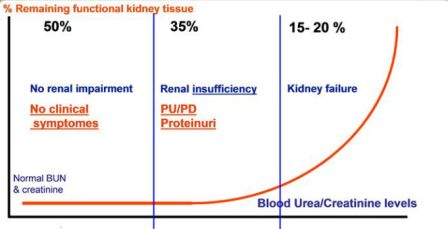Renal disease, also referred to as kidney disease or failure occurs in both cats and dogs.
What is Renal Failure?
In a healthy pet, the kidneys filter waste products that are produced by the body. The kidneys are responsible for cleansing the blood of the waste products and maintaining levels of water and salt within the body.
Blood enters the kidneys through renal arteries that then branch into capillaries called glomeruli. These filter the waste products from the blood. The connected tubules then reabsorb the amount of water and salt that the body needs, leaving the remaining fluid (urine) to pass from the kidneys to the bladder via the ureters.
Clinical signs
- Increased drinking (polydipsia)
- Increased urination (polyuria)
- Depression
- Decreased appetite
- Vomiting
- Weight loss
- Lethargy
- Hunched posture or reluctant to move
- Poor or unkempt coat
Renal failure can be divided into two categories: acute or chronic.
Acute Renal Failure (ARF)
Acute (sudden) renal failure occurs for example when a toxic substance like antifreeze has been ingested. It can also develop secondary to other conditions for example a blocked bladder. Affected pets need emergency, aggressive treatment to try and reverse some of the damage caused by the toxin.
This involves blood sampling and urine collection to determine how severe the problem is. Usually the blood results will show an increase, above normal ranges in the level of Blood Urea Nitrogen (BUN) and Creatinine in the blood. This is referred to as Azotaemia. For these levels to be elevated, usually at least 75% of the kidney is not functioning properly.
The urine analysis will measure the Urine Specific Gravity among other tests. This is a measurement of how concentrated the urine is. With renal failure the urine is not concentrated as too much water is lost and there will be a low specific gravity.
Intravenous fluids are administered to help ‘flush out’ the kidneys and rehydrate your pet. Once rehydration has taken place, the kidneys are supported using a special prescription diet which is low in protein and phosphorus and high in energy as well as medication where necessary.
Chronic Renal Failure (CRF)
Chronic renal failure usually develops gradually over time as your pet ages. It can also develop secondary to other problems like diabetes, hypertension or heart disease.
The kidneys suffer gradual irreversible damage that impairs their ability to filter and remove the waste products from the blood. Generally chronic renal failure occurs three times more frequently in cats than in dogs.
Treatment is similar as for acute renal failure. Bloods and urine samples are collected and tested. Intravenous fluids are administered to rehydrate your pet and replace lost fluids. Blood pressure will also be checked where appropriate. Long term management of renal failure involves the feeding of a prescription low protein, low phosphorus diet to help decrease the stress on the kidneys as well as medications and regular blood testing.
It is not possible to reverse chronic renal failure, and in most cases, it will progress over time despite appropriate therapy. The disease will eventually lead to the need for euthanasia.

At Cinque Ports Vets we run senior clubs to offer advice on age related problems. Here you can chat to a veterinary nurse about how best to care for your pet during their golden years. There is also the opportunity to have a urine test to routinely check your older pet’s urine. Early stages of kidney failure produce changes in the composition of the urine. Blood tests may also be recommended depending on the individual case but the earlier the signs are detected the better the chance of your pet having a longer, healthier life.
If your cat has recently been diagnosed with renal failure you may be interested to read ‘Caring For A Cat With Kidney Failure’ by Dr Sarah Caney.
It has been designed to be a complete guide to kidney failure in cats - from receiving the bad news and dealing with emotional issues, through to diagnosis, treatment and monitoring, to euthanasia and bereavement advice.
Please contact your local branch of Cinque Ports Vets if you have any concerns about your pet’s health or would like to find out more about our Senior Clubs. Why not try our Feline Renal Function Questionnaire.
Useful books:
Caring for a cat with chronic kidney disease by Dr Sarah Caney




